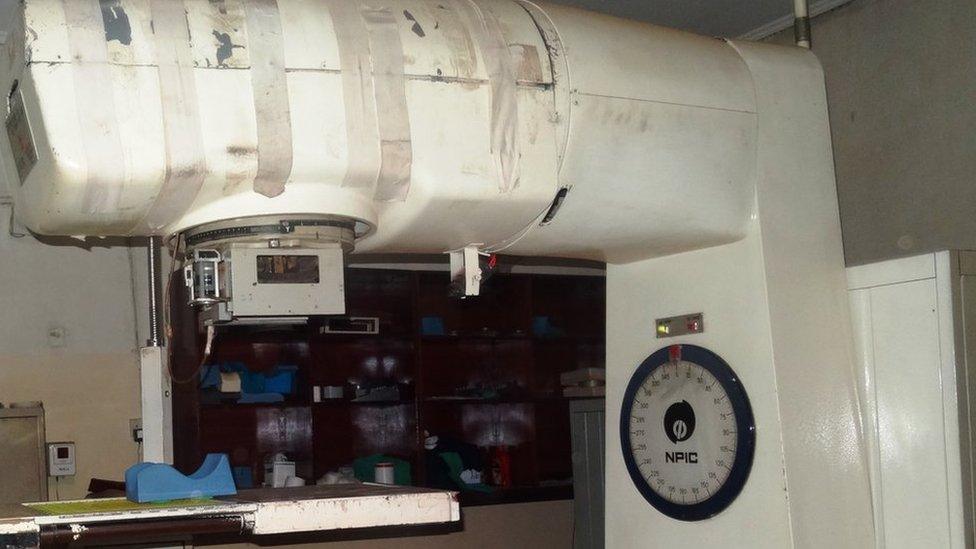Uganda cancer patients in limbo after radiotherapy machine breaks
- Published
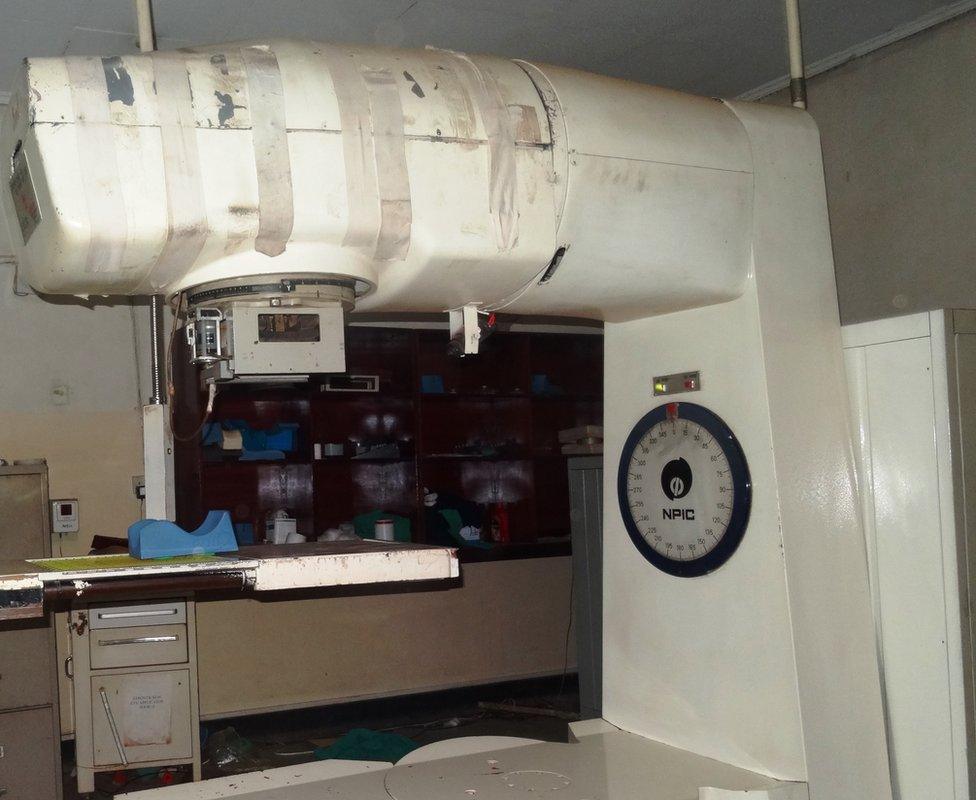
Uganda's radiotherapy machine, which is now broken beyond repair, was donated in 1995
Ugandan cancer patient Victoria Akware is stuck in a harrowing limbo.
The 55-year-old sold her land to help pay for her long trip to the capital, Kampala, to get treatment at the country's only specialist cancer unit.
But the radiotherapy machine, the only one of its kind in Uganda, that may have helped cure her cervical cancer has broken down beyond repair.
The only option for radiotherapy treatment is to travel to neighbouring Kenya, which she cannot afford. In fact, she cannot even afford the journey home, and so is living at a hostel for women cancer patients wondering what to do next.

Victoria Akware - Cancer patient
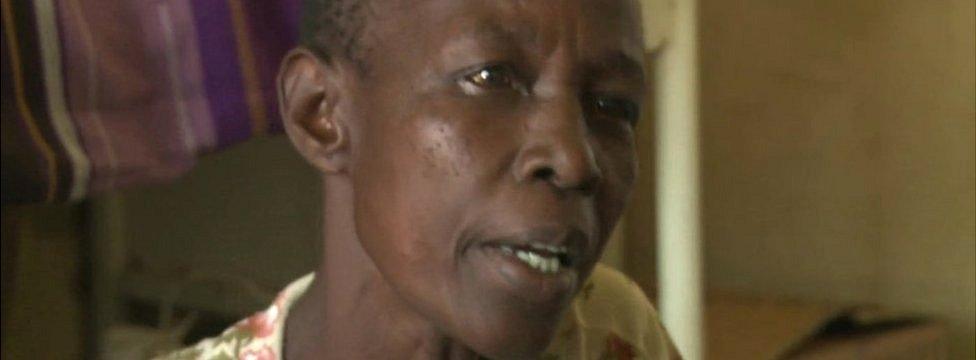
"There is no money to do anything. What remains is to pray to God to help me."

"I feel terrible, plus I'm in pain and I don't have money for expenses," Ms Akware says. "We are broke, there is no money to do anything. What remains is to pray to God to help me."
She smiles through the pain, but is left thinking about the financial sacrifices that she and other members of her family made for her to be here.
All the beds at the cramped hostel next to Mulago Hospital, home to the Uganda Cancer Institute, are taken up, and there are three patients in each of the dozen or so small rooms.
The floor space is also occupied by the mats, mattresses and pillows of relatives who have come to look after the patients - some of whom are breastfeeding mothers who have also brought their children.
They all came ready to receive treatment, but with the radiotherapy machine broken, one of the main weapons used to fight the cancer has gone.
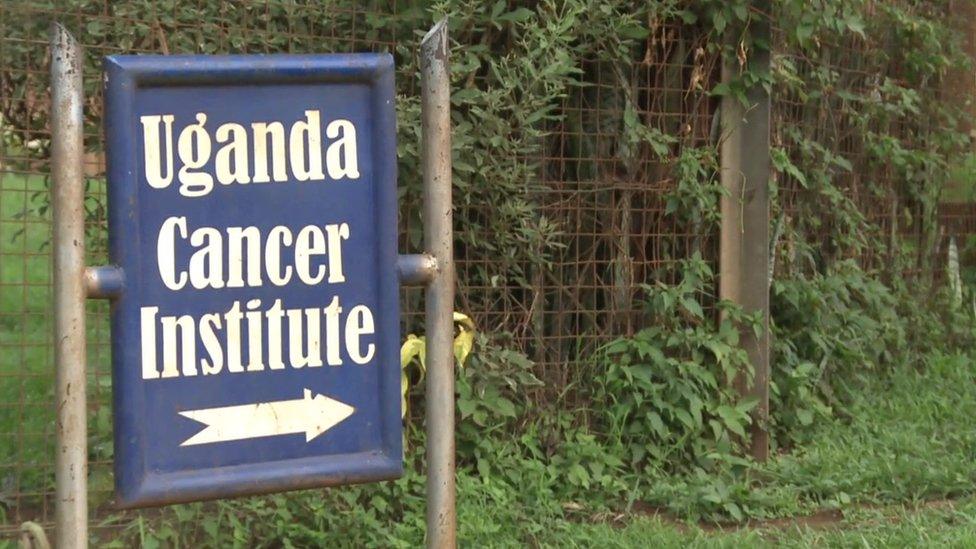
The institute has bought a new radiotherapy machine but upgrades need to be made before it can be installed
Radiotherapy uses radiation to target and kill cancerous cells in a specific part of the body, and can be used for many types of cancer.
Healthy cells are able to recover from this damage, while cancerous cells cannot.
Other treatments are still available in the country, but the cancer institute says that three-quarters of the 44,000 new cancer patients in Uganda last year needed radiotherapy, so the breakdown is a serious problem.
The number needing treatment is likely to rise as the the incidence of cancer is increasing Uganda, as in many African countries, because more people are living long enough to get these kind of diseases.
Waiting for a new machine
The government has said that it has purchased a new radiotherapy machine and it should be up and running in six months, once a special bunker is built to house the radioactive equipment.
But the department of health has known about the need to replace the old machine, which was donated in 1995, for the past five years at least, so some are sceptical that things will now move quickly.
In the meantime, the government says it can pay for about 400 patients to travel abroad for treatment, but the rest will have to find their own funds.
This is not simply a struggle for the poor - middle-class cancer patients are also feeling left stranded.

Elizabeth Mugalu - Cancer patient
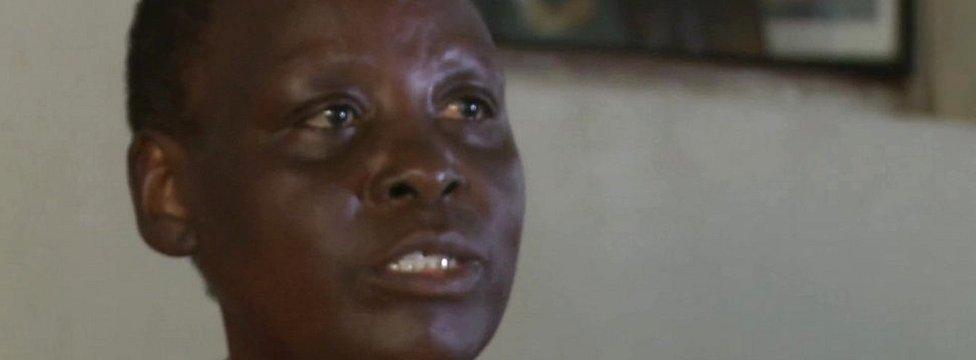
"The leadership has not understood what the local people go through. And this is brought about by the fact that they are not treated in Uganda."

Elizabeth Mugalu, who lives in the upmarket, leafy neighbourhood of Muyenga set on one of Kampala's many hills, has had breast cancer since 2010.
When she retired from teaching and writing, she and her husband started building their dream home, but it lies incomplete as funds have been diverted to pay for her treatment.
Ms Mugalu initially went to private hospitals, however when she could no longer afford the fees she started going to Mulago Hospital, which charges a lower rate for private patients.
'Who can afford treatment?'
But when the radiotherapy machine broke down, she had no choice but to go to the capital of neighbouring Kenya, Nairobi, where she paid $1,000 (£700) for the treatment. A figure that does not include accommodation, food and travel expenses.
"How many Ugandans can afford that?
"Not many," she says, answering her own question.
"The leadership has not understood what the local people go through. And this is brought about by the fact that they are not treated in Uganda, themselves. So if they were treated in Mulago Hospital, I'm sure they would understand what it is to go to Mulago and [there is no] medicine."
Her experience has led Ms Mugalu to become a health activist with the Uganda Women's Cancer Support Organisation and she is not alone with her anger.
The breakdown of the radiotherapy machine has sparked outrage amongst some in Uganda. Critics say the problem is an illustration of poor state of the country's healthcare system.
According to data from a World Health Organization report, external, Uganda's government spending on health per person is the lowest in East Africa.

Health Minister Elioda Tumwesigye
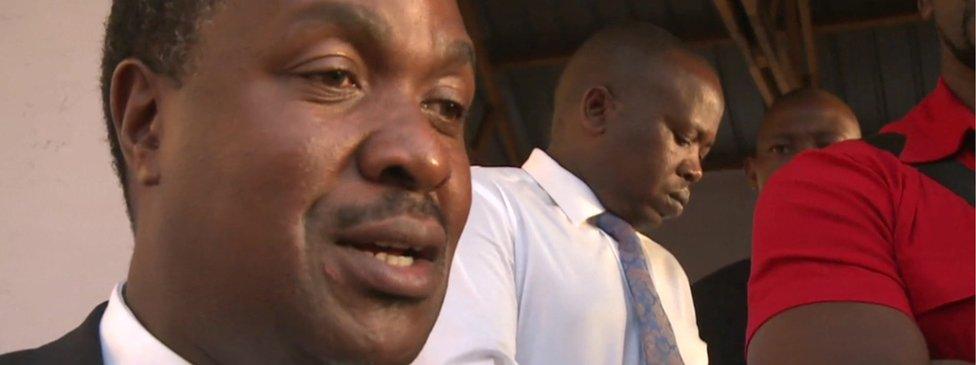
"We're the ones who buy all the coffins, to take people when they die. We're the ones who sometimes pay bills of these patients... So we know."

But Health Minister Elioda Tumwesigye defends the government's record.
He says that though it has had to prioritise major infrastructure projects, like roads and electricity provision, and defence, it has also increased the budget of the cancer institute, and he insists government ministers are involved at a very personal level.
"We're the ones who buy all the coffins, to take people when they die. We're the ones who sometimes pay bills of these patients when they're in health facilities. So we know.
"I lost both my parents to cancer and they were treated here [at Mulago]."
The minister says that the cancer institute will build not one but seven bunkers to house even more radiotherapy machines in the future.
But it is not clear what will happen to the patients between now and when the new facilities are ready.
And Victoria Akware is left wondering what she is going to do to have a fighting chance of surviving cancer.
- Published8 April 2016
